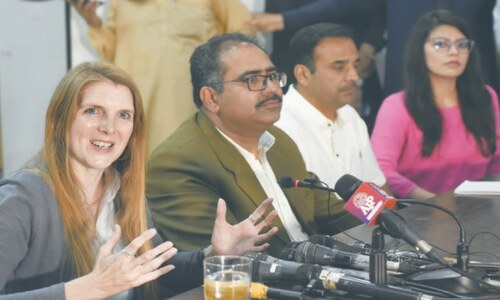ISLAMABAD: The budget 2016-17 will be pro-growth, pro-industry and pro-economy, said special adviser to the prime minister on revenue, Haroon Akhtar.
“The budget will encourage people to invest in various industries and with that they will be investing in the people of Pakistan,” Mr Akhtar said while speaking as chief guest at a pre-budget seminar on the ‘Status of the economy and federal budget 2016-17’ on Tuesday.
The seminar was organised by the Centre for Policy Studies and Comsats University.
According to the adviser, the government was aiming to become an economic power with a zero fiscal deficit.
“This will enable the country to build infrastructure such as highways and bridges from its own capital rather than the borrowed money,” he added.
Mr Akhtar emphasised increasing tax to the gross domestic product (GDP) ratio.
“The mindset of people in the country is to avoid paying taxes. Some of the best taxpayers, who are only 0.1pc in the country, continue to evade taxation. Non-filers will be penalised heavily.”
PM’s adviser says budget 2016-17 will encourage people to invest in industries
About the current state of economy, Mr Akhtar said it was better after the military operation Zarb-i-Azab and the Rangers’ operation in Karachi.
“Inflation is at the lowest in the history of the country as well as the region at 2.5pc in the last nine months, interest rates are down significantly to 6pc and the fiscal deficit, which stood at 8.8pc not so long ago, is less than 4.4pc and going down. The GDP growth is up from 2pc and 3pc to 5pc.”
He quoted statements from the World Bank and the International Monetary Fund, which described Pakistan on the path to progress.
“There is substantial progress in repairing Pakistan’s economy and Islamabad is right to say that it does not need assistance,” he said, reading out a statement from the IMF.
He also gave examples of how loadshedding was reduced from 12 and 18 hours a day to four and six hours daily.
“The government is on the path of adding 10,000 MW to meeting energy shortage and will add another 15,000 MW by 2025. As much as 11pc more electricity has been produced since January,” said Mr Akhtar.
He also claimed that the large-scale manufacturing had increased, such as the automobile sector with 14pc, cement 15pc and fertiliser 13pc growth besides the booming retail sector.
He compared the rupee with other currencies such as the Euro, which has depreciated by 25pc, the currency in Brazil crashed and depreciation in Chinese Yuan caused the country’s exports to decline more than 25pc which was the lowest drop since 2009, affecting other nations that traded with China.
Similarly, Mr Akhtar described the country to be on a vibrant growth trajectory, especially with Gwadar and the China Pakistan Economic Corridor becoming a reality in the near future.
Discussions followed in two sessions on increasing Pakistan’s exports, changes in the tax policy, improving business and investment climate, challenges to reform the energy sector and on investments and the fiscal policy.
Published in Dawn, May 4th, 2016














































Dear visitor, the comments section is undergoing an overhaul and will return soon.